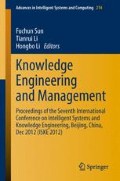Abstract
Recently recommender systems are introduced into the web-based government applications which expect to provide personalized Government-to-Business (G2B) e-Services. For more personalization, we illustrate a subjective signed trust relationship between users, and based on such trust we proposed a recommendation framework for G2B e-services. A case study is conducted as an example of implementing our approach in e-government applications. Empirical analysis is also conducted to compare our approach with other models, which shows that our approach is of the highest. In conclusion, the signed trust relationship can reflect the real preferences of users, and the proposed recommendation framework is believed to be reliable and applicable.
Access this chapter
Tax calculation will be finalised at checkout
Purchases are for personal use only
References
Balabanovic M, Shoham Y (1997) Fab: content-based, collaborative recommendation. Commun ACM 40:66–72
Goldberg D et al (1992) Using collaborative filtering to weave an information tapestry. Commun ACM 35:61–70
Shambour Q, Lu J (2011) A hybrid trust-enhanced collaborative filtering recommendation approach for personalized government-to-business e-services. Int J Intell Syst 26:814–843
Massa P, Avesani P (2004) Trust-aware collaborative filtering for recommender systems. In: OntheMove confederated international workshop and conference. Springer-Verlag, Berlin, pp 492–508
Golbeck JA (2005) Computing and applying trust in web-based social networks. Ph D, University of Maryland
Golbeck J (2006) Combining provenance with trust in social networks for semantic web content filtering. In: International provenance and annotation workshop (IPAW 2006). Springer-Verlag, Berlin, pp 101–108
Golbeck J, Hendler J (2006) Filmtrust: movie recommendations using trust in web-based social networks. In: 3rd IEEE consumer communications and networking conference. Citeseer, Las Vegas, pp 282–286
O’Donovan J, Smyth B (2005) Trust in recommender systems. In: 10th international conference on intelligent user interfaces. ACM, San Diego, pp 167–174
Hwang CS, Chen YP (2007) Using trust in collaborative filtering recommendation. In: 20th international conference on industrial, engineering and other applications of applied intelligent systems. Springer-Verlag, Berlin, pp 1052–1060
Herlocker J et al (2002) An empirical analysis of design choices in neighborhood-based collaborative filtering algorithms. Inf Retrieval 5:287–310
Resnick P et al (1994) GroupLens: an open architecture for collaborative filtering of netnews. In: 1994 ACM conference on computer supported cooperative work. ACM, New York, pp 175–186
Porcel C et al (2012) A hybrid recommender system for the selective dissemination of research resources in a technology transfer office. Inf Sci 184:1–19
Vozalis MG, Margaritis KG (2007) Using SVD and demographic data for the enhancement of generalized collaborative filtering. Inf Sci 177:3017–3037
Barragans-Martinez AB et al (2010) A hybrid content-based and item-based collaborative filtering approach to recommend TV programs enhanced with singular value decomposition. Inf Sci 180:4290–4311
Sarwar B et al (2000) Analysis of recommendation algorithms for e-commerce. In: ACM E-Commerce 2000 conference. ACM, New York, pp 158–167
Acknowledgments
The work presented in this paper was partially supported by the Australian Research Council (ARC) under discovery grant DP110103733.
Author information
Authors and Affiliations
Corresponding author
Editor information
Editors and Affiliations
Rights and permissions
Copyright information
© 2014 Springer-Verlag Berlin Heidelberg
About this paper
Cite this paper
Mao, M., Zhang, G., Lu, J., Zhang, J. (2014). A Signed Trust-Based Recommender Approach for Personalized Government-to-Business e-Services. In: Sun, F., Li, T., Li, H. (eds) Knowledge Engineering and Management. Advances in Intelligent Systems and Computing, vol 214. Springer, Berlin, Heidelberg. https://doi.org/10.1007/978-3-642-37832-4_9
Download citation
DOI: https://doi.org/10.1007/978-3-642-37832-4_9
Published:
Publisher Name: Springer, Berlin, Heidelberg
Print ISBN: 978-3-642-37831-7
Online ISBN: 978-3-642-37832-4
eBook Packages: EngineeringEngineering (R0)

